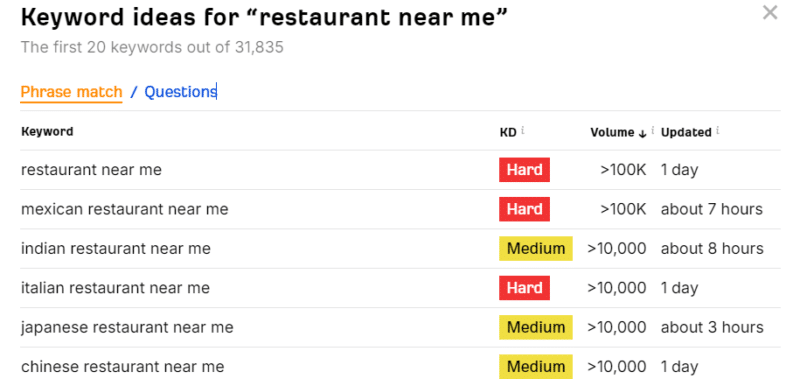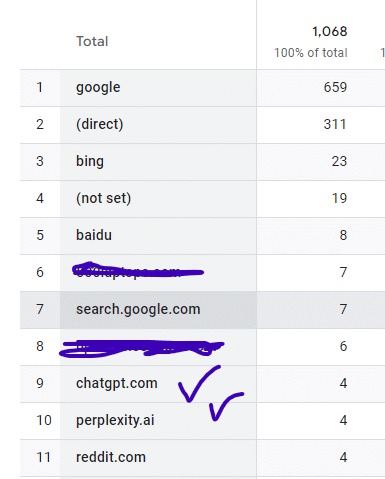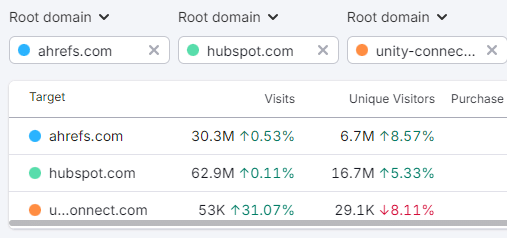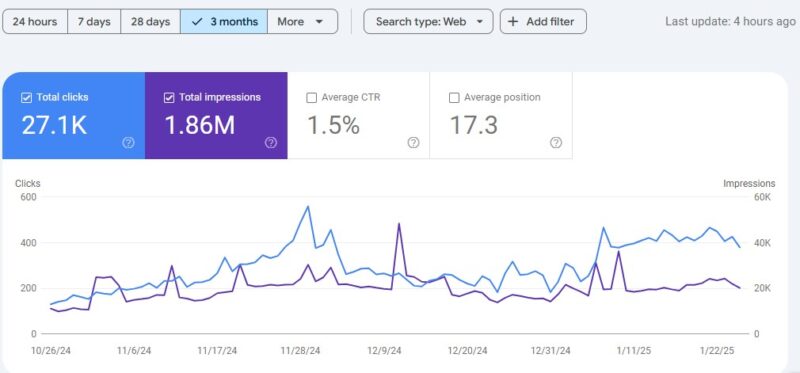According to research, over 85% of shoppers search businesses online before making any purchase, utilizing search engines like Google, Bing, Yahoo, Yandex, ChatGPT, and Perplexity.
The best part is that you can target all these customers with effective search engine optimization (SEO) strategies.
If you’re not leveraging SEO, you’re missing out on a massive market.
That’s why it’s crucial for any business to optimize their website for search engines. In some cases, businesses might not even have a website, but they can still use basic strategies to make their business appear on Google, which holds over 90% of the global search engine market share.
This provides a huge opportunity to capture a significant portion of the search market.
Now, to help you understand why SEO is crucial for your business, here are some incredible benefits you can expect when you execute your SEO strategy effectively.
On this page
This is the largest market your business might be ignoring:
With over 4.97 billion people using Google—accounting for more than 92% of all internet users—the opportunity for your business is enormous.
Not only do consumers search for products and services, but many are also seeking local businesses. In fact, searches that include “near me” have surged, indicating a strong intent to find services in their vicinity.

Furthermore, e-commerce stores are thriving thanks to Google searches.
This means potential customers actively looking for your products and services are already on Google and Bing, exploring various topics relevant to your business. Now they also use ChatGPT and Perplexity.
You have the opportunity to target these inquiries effectively.
For instance, look at this, how I drive traffic from all the search engines including chatGPT and Perplexity.

Basically, there are two primary methods to capture a share of this search market:
- Investing in Ads (PPC): This strategy provides immediate traffic as long as you continue to spend money.
- Investing in SEO: This strategy focuses on acquiring organic traffic.
Investing in ads means you’ll gain traffic only as long as you’re willing to pay. In contrast, SEO is a long-term investment.
When you invest in SEO today, you can reap the benefits for years to come. Once your site secures a position on Google’s first page, it won’t vanish overnight. Even if you reduce your SEO efforts, your website can continue to attract visitors for an extended period.
If your business is not prioritizing SEO and has long-term growth aspirations, you’re missing out on the world’s largest market.
SEO drives traffic organically, without the ongoing Ad costs:
SEO (search engine optimization) means optimizing your website (or any webpage) so that it organically ranks on search engines and drives free traffic.
I assume you already know it works:
Whenever someone needs help, they search on search engines like Google, Bing, Yahoo, Ask, etc. Those search engines fetch the solutions from billions of available websites.
With the right SEO efforts, you compete with those billions of web pages to make your website appear in front of your potential clients looking for your products/solutions.
The optimization process will surely cost you money, but once it’s done, the traffic is always free and keeps growing over time making the cost cheaper over time.
For instance, look at this estimated organic traffic.

Ahrefs is a SaaS company, HubSpot is a CRM, and Unity Connect is a BPO company. Through their SEO efforts, they receive 30.3 million, 62.9 million, and 53,000 organic visits. If you estimate the traffic value, it would be worth millions of dollars but they acquire it with no ad spend.
The question that might arise in your mind is how much traffic you can acquire with SEO.
Search engines don’t limit or distribute traffic. Some websites get traffic in quite a few hundred and some drive literally millions of free visitors. It all depends on your efforts and industry potential.
SEO: It helps you connect with the right users
If you’ve ever run ads on social media, you probably know how challenging it is to reach the right audience. You spend your budget showing ads to as many people as possible, then use that data to create an ideal user profile to better target potential customers.
But SEO works differently—and it’s easier. Unlike ads, SEO is an inbound marketing strategy that only focuses on users who are actively searching for products or services like yours.
Let’s say you own a car dealership. Instead of blasting ads, SEO allows you to attract users who are already searching for “local car dealers,” “new car models,” or “car prices in [your area].” These search queries, called keywords, are the backbone of SEO.
When you target the right keywords, you’re bringing in people who already have an interest in what you offer, making them more likely to convert.
For example, someone searching “best hybrid cars 2025” is far more likely to visit your dealership than someone passively scrolling through social media.
The best part? Finding these keywords isn’t hard, and in many cases, it’s completely free.
Tools like Google’s Ads Planner can help you discover high-value keywords along with their search volumes. Once you have the right keywords, you can target them using white-hat SEO techniques, which are strategies approved by Google.
By focusing on the right keywords, you’re not just reaching more people; you’re reaching the right people—those who are already one step closer to making a purchase.
You can use SEO to elevate your brand’s visibility:
Brand awareness is one of the top priorities for any business. Building a strong brand presence can significantly impact your overall success, and SEO is a powerful tool to help you achieve this without the hefty costs associated with traditional advertising.
When you focus on SEO, you can target multiple keywords and cover as many topics you want, allowing you to maximize your visibility in search results.
Take the example of Mailchimp, a well-known email marketing platform. They have effectively used SEO to enhance their brand awareness by providing valuable content around email marketing strategies, automation tips, and best practices.
By ranking highly for these types of content, Mailchimp not only drives traffic to its website but also establishes itself as an industry leader, fostering trust and familiarity with its audience.
By providing solutions to the majority of user problems through valuable content, you naturally enhance your brand awareness. As users find answers to their questions on your website, they start to trust your brand more. This trust not only fosters loyalty but also encourages customers to choose your business over competitors.
Businesses gain trust with SEO that boosts conversions:
Trust matters a lot, especially in B2B. It can make or break your business. That’s why 77% of B2B companies consider branding—a key element in building trust—a core part of their strategy.
Additionally, 62% of B2B buyers engage with content from brands that have a strong, recognized presence, often researching them online before making purchasing decisions. When businesses create high-quality, informative content—such as whitepapers, blog posts, or case studies—optimized for relevant keywords, they position themselves as industry experts.
Here’s how it matters: it can not only help you drive business with inbound leads but also enhance your outbound efforts.
Imagine you’ve launched an email marketing campaign, reaching out to potential clients. If they show any interest, the first thing they’re likely to do is search for your brand online. If your brand isn’t visible on search engines or lacks authentic content, you risk losing the deal due to a lack of trust.
According to the Content Marketing Institute, 71% of B2B marketers use content marketing to establish authority. Thus, SEO can help you build trust and generate business.
SEO improves user experience on your website as it’s a ranking factor:
Search engines aim to provide the best possible results for their users, never wanting to disappoint. That’s why they continuously prioritize websites that offer excellent user experiences and update their algorithms to reflect this priority.
Search engines, especially Google, frequently discuss these algorithm updates, emphasizing their goal of encouraging businesses to enhance user satisfaction.
For instance, they encourage websites that pass Core Web Vitals (CWV), which means your site should be easy to navigate and load in under 2.5 seconds.
Every big brand is turning to follow this trend. Some SEO experts claim that they have doubled their organic traffic simply by improving the Core Web Vitals metrics of their websites. I’ve also observed a correlation between speed and rankings.
This means that by focusing on SEO, you also gain insights into what constitutes an ideal user experience. Following search engine guidelines allows you to make your pages not only compatible with search engines but also user-friendly.
For instance, gone are the days when websites were overdesigned, difficult to navigate, and slow to load. Today’s users prefer fast, clean, and easy-to-navigate sites. According to a study by Google, 53% of mobile users abandon sites that take longer than 3 seconds to load.
Furthermore, research by the Nielsen Norman Group indicates that users are more likely to trust and return to sites that offer a seamless experience.
As a result, these factors have become critical ranking signals in SEO. Therefore, if your business prioritizes SEO, you’re inherently focusing on providing the best user experience.
SEO is cheaper than running Google or social media ads:
Businesses spend a lot of money on ads. While ads yield quick results, they can become a significant burden over time.
In contrast, in SEO, you start by identifying keywords, creating optimized content, publishing it, building backlinks, and then waiting for results to materialize.
This process can take time, which may make businesses hesitant to invest money upfront with the expectation of seeing results in months.
For instance, I started an SEO campaign 6 months ago and now it’s acquiring over 400 visitors a day from Google, and a few from other search engines.

However, investing in SEO is less risky and often more rewarding than running ads.
SEO vs Other Marketing Channels:
| Channel | Cost Per Click | Targeting | Long-Term Value | Trust Factor |
|---|---|---|---|---|
| Google Ads | High | Strong | Ends when budget ends | Medium |
| Social Media Ads | Medium | OK | Low long-term value | Low |
| SEO | None (after setup) | Keyword-driven | Compounds over time | High |
Research shows that businesses can expect, on average, a 2.75 times return on investment (ROI) from SEO. In the long run, the returns can be even higher as it’s all about a long-term strategy.
For instance, if you target a webpage for a keyword like “men’s clothes” or any low-competition keyword and manage to rank on the first page of Google, you could continue to receive traffic for that keyword long after the initial work is done, especially if you periodically update the content.
In some cases, where bidding is high SEO becomes way cheaper than usual.
A specific example from the BPO industry highlights this benefit. Research indicates that acquiring clients through SEO can be 16.25 times cheaper than running ads on Google for transactional keywords.
This demonstrates how effective SEO can be in driving cost-effective client acquisition.
Trackable results for continuous improvement:
As mentioned earlier, investing in SEO typically requires patience; you may need to wait at least 3 months to see results. In the first 3 moths, Google and other search engines analyzes your website to see where they should rank your site.
Unlike search engine or social media ads, which can deliver immediate outcomes, SEO progress unfolds over time. However, this doesn’t mean you invest blindly.
With SEO, you have a complete record of your website’s performance on search engines.
For instance, you can create a free account on Google Search Console (GSC) to monitor your web page’s rankings. This tool allows you to track whether your rankings are improving over time. The screenshot I shared above is also from GSC.
If your ranking for a keyword is 50 this month, you should aim for a lower position next month, with the ultimate goal of reaching position 1.
In your GSC account, you will receive real-time data on how your pages appear in search results and how users interact with them. This data is highly accurate and valuable for your SEO strategy.
Keep in mind that achieving position 1 takes time, but you can reach the first page within three months for many keywords.
In my experience with various keywords, focusing on untapped opportunities and creating high-quality content can lead to first-page rankings in as little as a week. However, the timeline depends significantly on the competition; highly competitive keywords with substantial search volumes can take years to secure position 1.
SEO helps businesses understand competitors:
Understanding your competitors is crucial for business success. It provides insights into what they are doing, highlighting both their strengths and weaknesses. Here, SEO offers valuable insights that can help you analyze your competitors effectively.
For instance, if you discover that a competitor’s blog posts on a specific topic are performing well on Google and Bing, you can assess what they are doing right—whether it’s their content quality, structure, or the keywords they’re targeting.
Additionally, analyzing backlinks can reveal where competitors are getting their traffic from. This information can be instrumental in identifying potential partnership opportunities or outreach strategies.
For example, if several competitors are linked to by a specific industry publication, that could indicate a valuable platform for your own outreach efforts.
SEO helps you target clients throughout their buying journey:
If you’re in business, you likely know the importance of the buying cycle—a process that users go through on their journey toward making a purchase.
This journey has evolved over time. In the past, people might have asked their friends for product recommendations. Now, they turn to search engines like Google for help.
For instance, if someone is looking to buy a business computer, their first step might be researching which computer is best suited for business needs. They’ll likely search for a buying guide that can help them make an informed decision.
If your e-commerce store sells computers, you can capture these early-stage buyers by creating content like buying guides tailored to different business types and needs.
The same applies to other industries.
Here is another example: If a company is looking to outsource its customer service operations, they might start by researching what outsourcing entails, how it can benefit their business, and which providers offer the best services.
If your BPO firm has SEO-optimized content explaining the benefits of outsourcing customer support, you can connect with potential clients at the awareness stage, well before they make any purchase decision.
his early engagement can give you an edge over competitors who only focus on the later stages of the sales funnel.
SEO helps businesses bypass the competition:
Competition is everywhere in the digital landscape. Even if you run ads, you must fully optimize them to stand out against your competitors. However, SEO offers a unique opportunity to bypass the competition altogether.
Google has revealed that nearly 15% of daily searches are entirely new queries. This means that at least 15% of search terms are not yet answered or discussed online.
By identifying and targeting these untapped queries, you can position your business as the only one satisfying those user needs.
Finding profitable keywords, whether they are untapped or low-competition, can be incredibly valuable. You can hire SEO writers to create optimized content or do it yourself by incorporating LSI (Latent Semantic Indexing) keywords. By doing this, you can effectively promote your products or services without facing direct competition.
Moreover, even if you don’t immediately sell a product, focusing on these keywords will still yield brand awareness, establishing your business in the minds of potential customers.
Overall, SEO is the most cost-effective way to build your brand and generate leads and sales as part of a long-term strategy.
Is SEO worth it for small businesses?
SEO has a very decent ROI for any business. Secondly, it’s a huge market for long-term businesses. So overall, SEO is worth it for small businesses.
Does every business need SEO?
SEO is a long-term strategy. All those businesses that have plans to run businesses for years should invest in SEO. The reason is that it’s cost-effective and has a better ROI.
Is seo cheaper than Google ads?
Yes, SEO is generally cheaper in the long run. Sometimes, when CPC is too high, SEO becomes over 16 times cheaper than running Google ads. But Google Ads can be more effective for short-term, immediate traffic.
How much does Google SEO cost?
The answer depends on several factors: How many pages do you want to target, how aggressively do you want to pursue SEO, and what goals and expectations do you have for your website?
If you have high expectations, need quick results, and plan to run digital campaigns for news mentions, the cost can range from $5,000 to $10,000 per month.
On the other hand, if you have just two service pages to rank for and your primary goal is to drive paying clients within the next 6 months, many U.S.-based agencies will charge around $3,000 per month due to their expensive labor costs. However, I offer the same quality services for only $1,000 per month.